Shouzheng Huang
On The Role of Pretrained Language Models in General-Purpose Text Embeddings: A Survey
Jul 28, 2025Abstract:Text embeddings have attracted growing interest due to their effectiveness across a wide range of natural language processing (NLP) tasks, such as retrieval, classification, clustering, bitext mining, and summarization. With the emergence of pretrained language models (PLMs), general-purpose text embeddings (GPTE) have gained significant traction for their ability to produce rich, transferable representations. The general architecture of GPTE typically leverages PLMs to derive dense text representations, which are then optimized through contrastive learning on large-scale pairwise datasets. In this survey, we provide a comprehensive overview of GPTE in the era of PLMs, focusing on the roles PLMs play in driving its development. We first examine the fundamental architecture and describe the basic roles of PLMs in GPTE, i.e., embedding extraction, expressivity enhancement, training strategies, learning objectives, and data construction. Then, we describe advanced roles enabled by PLMs, such as multilingual support, multimodal integration, code understanding, and scenario-specific adaptation. Finally, we highlight potential future research directions that move beyond traditional improvement goals, including ranking integration, safety considerations, bias mitigation, structural information incorporation, and the cognitive extension of embeddings. This survey aims to serve as a valuable reference for both newcomers and established researchers seeking to understand the current state and future potential of GPTE.
KaLM-Embedding-V2: Superior Training Techniques and Data Inspire A Versatile Embedding Model
Jun 26, 2025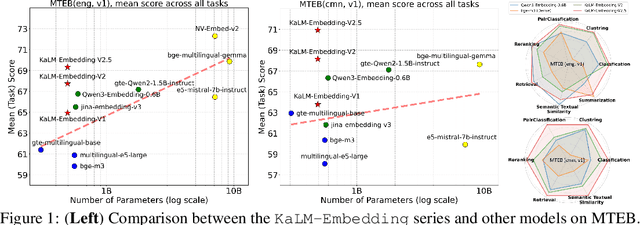



Abstract:In this paper, we propose KaLM-Embedding-V2, a versatile and compact embedding model, which achieves impressive performance in general-purpose text embedding tasks by leveraging superior training techniques and data. Our key innovations include: (1) To better align the architecture with representation learning, we remove the causal attention mask and adopt a fully bidirectional transformer with simple yet effective mean-pooling to produce fixed-length embeddings; (2) We employ a multi-stage training pipeline: (i) pre-training on large-scale weakly supervised open-source corpora; (ii) fine-tuning on high-quality retrieval and non-retrieval datasets; and (iii) model-soup parameter averaging for robust generalization. Besides, we introduce a focal-style reweighting mechanism that concentrates learning on difficult samples and an online hard-negative mixing strategy to continuously enrich hard negatives without expensive offline mining; (3) We collect over 20 categories of data for pre-training and 100 categories of data for fine-tuning, to boost both the performance and generalization of the embedding model. Extensive evaluations on the Massive Text Embedding Benchmark (MTEB) Chinese and English show that our model significantly outperforms others of comparable size, and competes with 3x, 14x, 18x, and 26x larger embedding models, setting a new standard for a versatile and compact embedding model with less than 1B parameters.
Perception, Reason, Think, and Plan: A Survey on Large Multimodal Reasoning Models
May 08, 2025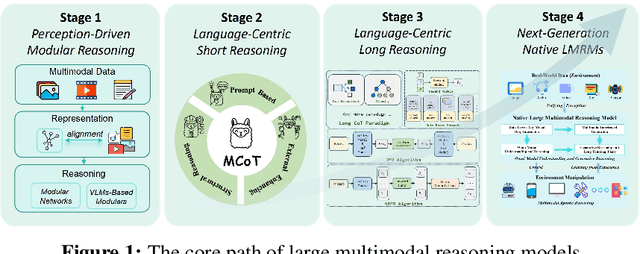
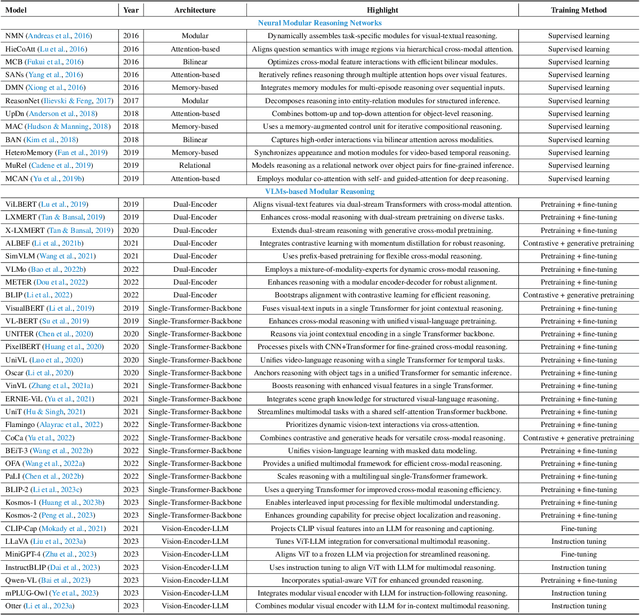
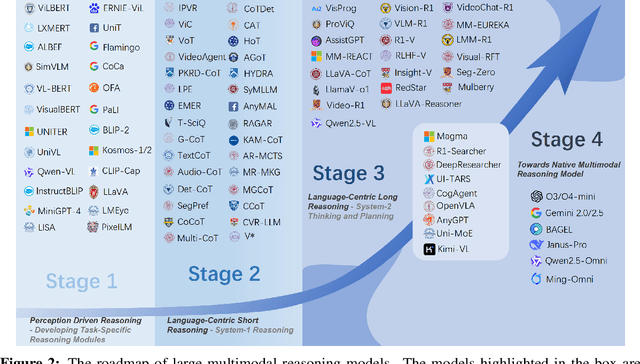
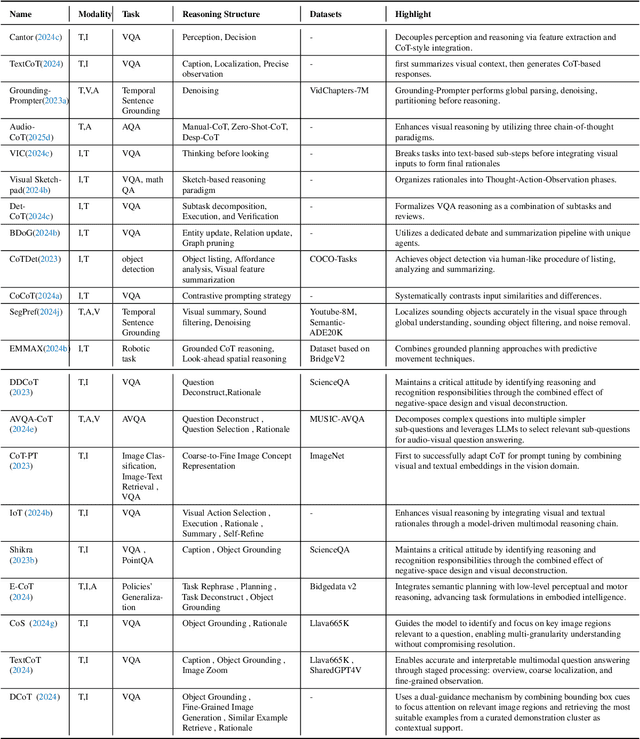
Abstract:Reasoning lies at the heart of intelligence, shaping the ability to make decisions, draw conclusions, and generalize across domains. In artificial intelligence, as systems increasingly operate in open, uncertain, and multimodal environments, reasoning becomes essential for enabling robust and adaptive behavior. Large Multimodal Reasoning Models (LMRMs) have emerged as a promising paradigm, integrating modalities such as text, images, audio, and video to support complex reasoning capabilities and aiming to achieve comprehensive perception, precise understanding, and deep reasoning. As research advances, multimodal reasoning has rapidly evolved from modular, perception-driven pipelines to unified, language-centric frameworks that offer more coherent cross-modal understanding. While instruction tuning and reinforcement learning have improved model reasoning, significant challenges remain in omni-modal generalization, reasoning depth, and agentic behavior. To address these issues, we present a comprehensive and structured survey of multimodal reasoning research, organized around a four-stage developmental roadmap that reflects the field's shifting design philosophies and emerging capabilities. First, we review early efforts based on task-specific modules, where reasoning was implicitly embedded across stages of representation, alignment, and fusion. Next, we examine recent approaches that unify reasoning into multimodal LLMs, with advances such as Multimodal Chain-of-Thought (MCoT) and multimodal reinforcement learning enabling richer and more structured reasoning chains. Finally, drawing on empirical insights from challenging benchmarks and experimental cases of OpenAI O3 and O4-mini, we discuss the conceptual direction of native large multimodal reasoning models (N-LMRMs), which aim to support scalable, agentic, and adaptive reasoning and planning in complex, real-world environments.
RaSeRec: Retrieval-Augmented Sequential Recommendation
Dec 24, 2024

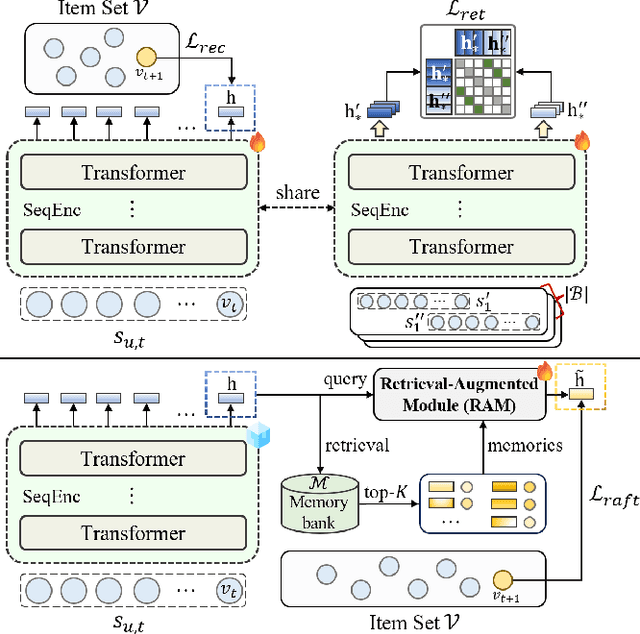
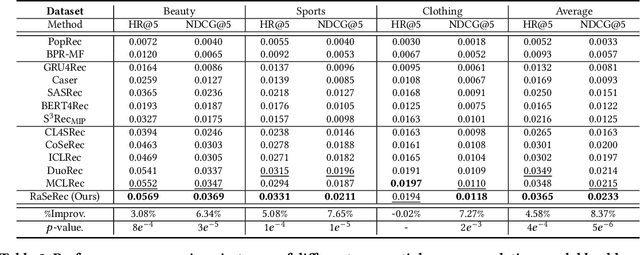
Abstract:Although prevailing supervised and self-supervised learning (SSL)-augmented sequential recommendation (SeRec) models have achieved improved performance with powerful neural network architectures, we argue that they still suffer from two limitations: (1) Preference Drift, where models trained on past data can hardly accommodate evolving user preference; and (2) Implicit Memory, where head patterns dominate parametric learning, making it harder to recall long tails. In this work, we explore retrieval augmentation in SeRec, to address these limitations. To this end, we propose a Retrieval-Augmented Sequential Recommendation framework, named RaSeRec, the main idea of which is to maintain a dynamic memory bank to accommodate preference drifts and retrieve relevant memories to augment user modeling explicitly. It consists of two stages: (i) collaborative-based pre-training, which learns to recommend and retrieve; (ii) retrieval-augmented fine-tuning, which learns to leverage retrieved memories. Extensive experiments on three datasets fully demonstrate the superiority and effectiveness of RaSeRec.
 Add to Chrome
Add to Chrome Add to Firefox
Add to Firefox Add to Edge
Add to Edge